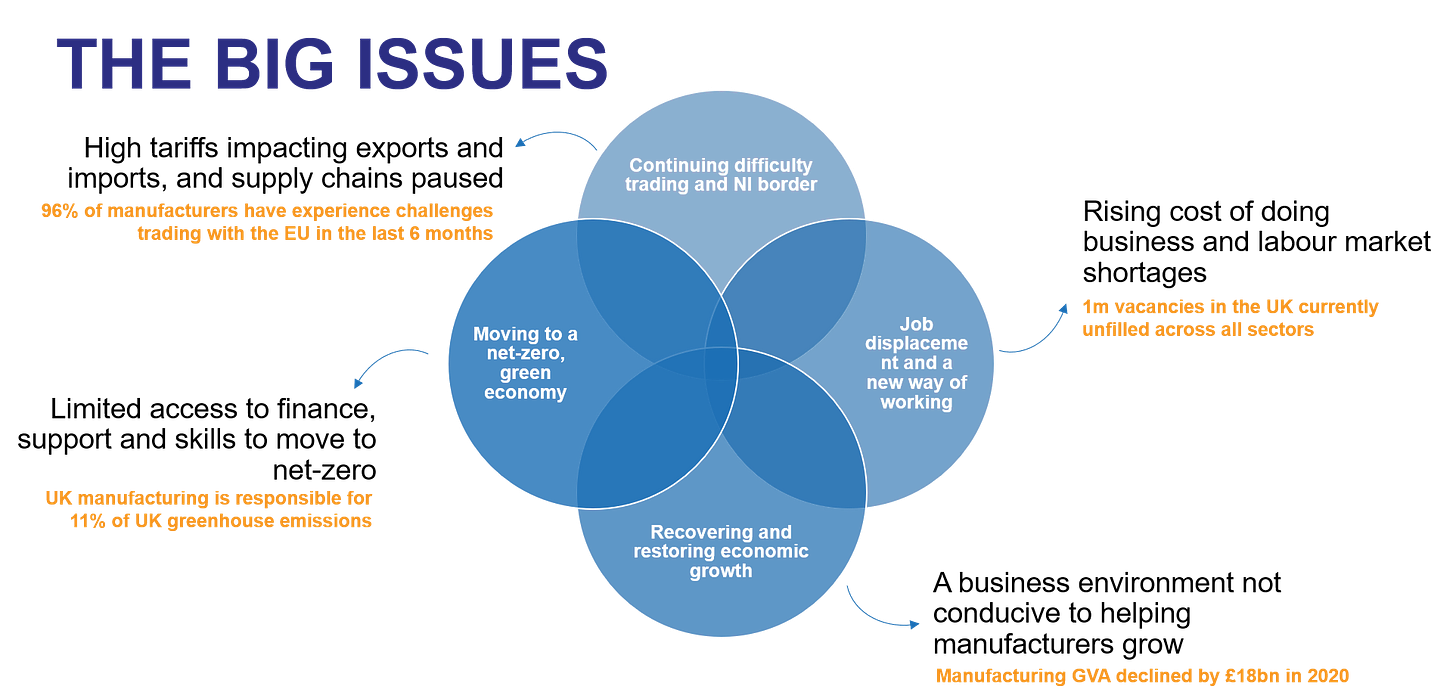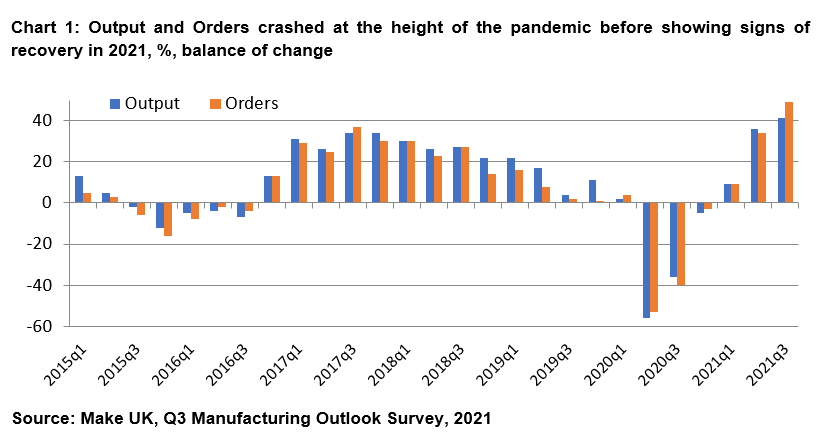📣 UK manufacturing matters. Here's why
Hi there!
Welcome to the very first issue of Manufacturing Mondays.
It's everything you need to know about the big policy issues impacting the UK manufacturing sector, and our ideas to overcome them.
Why should you subscribe?
UK manufacturing is a crucial sector of the economy. The 20,000 manufacturers we represent account for:
11% of the UK's GDP
Over half of everything the UK exports to the world
And a whopping 65% of all R&D carried out in the UK
So as we think about future policy-making and Government priorities, it has never been more important for the voice of UK manufacturing to be heard across Government, policymakers, and wider stakeholders.
Plus, we only send this once a week and it takes 3 minutes to read. We timed it.
Enjoy issue one!
✍🏽 This week's intro remarks are from Head of Policy & Campaigns, Bhavina Bharkhada
Campaigning for UK manufacturing
All throughout 2020 and 2021, the UK manufacturing sector demonstrated its importance to our economy. During the Covid-19 pandemic, the industry demonstrated a herculean effort to support the UK when it needed it most. From making hand sanitisers, to producing vital PPE to the participation in the groundbreaking Ventilator project.
In short, the manufacturing sector in the UK has not only shown its attitude towards stepping up to national challenges, but it has exhibited its critical strategic importance to the UK’s economy, especially in times of crisis.
We've been amplifying this message to Government, the Opposition and MPs across the house.
Read more about how our 2021 campaigns have and continue to shape the Government's agenda.
But it’s not just what we’ve done, it’s what we are doing to continue to support manufacturers. And why we believe, policymakers should take notice of how the sector can help tackle the big societal issues we face in 2022 and years ahead.
The big issues impacting the sector
Given this is the first issue, we thought it would be helpful to recap the big issues that were felt by manufacturers all this year. Here are the big four:
Unsurprisingly, most of these will continue into 2022, influencing everything from the way in which manufacturers work, to how the sector imports and exports its goods to the world.
This all comes at a time when manufacturers are already facing incoming corporation tax and national insurance contribution hikes which will drive up the cost of doing business. All of which begs the question:
Is the Government creating a conducive environment for business growth, greater investment, and the scaling up of SMEs?
Well, despite record-breaking results in our latest Q3 Manufacturing Outlook, as Senior Economist Fhaheen Khan puts it:
Supply chain shortages and the rapidly escalating increase in shipping costs are threatening to put roadblocks on the road to faster growth despite the current optimism
So despite the optimism of full order books, grey clouds may be on the horizon with supply-side issues a hindrance to any future growth.
Our Autumn Budget and Spending Review submission outlines a series of immediate, six-month, and 12-month measures Government can take to create the necessary conditions for manufacturers to grow.
We'll be sharing our CSR submission in two weeks, so keep your eyes peeled.
What's on our reading list
In this section, we share interesting articles that have caught our eye and got us thinking. This week's articles are:
Industrial Policy’s Comeback
The original author of the Industrial Strategy Mariana Mazzucato gives her take on why we need a mission-oriented approach to the economy that embraces an active role for the Government in spurring on growth and innovation ahead of the Autumn CSR.
If firms are confident about future technological and market opportunities they will invest and seek to innovate; and conversely, if they are not confident, they will not invest. Any industrial strategy should therefore aim to stimulate demand and increase business expectations about where future growth opportunities might lie.
Long read → https://bit.ly/3COsPXb
Attempting to define 'Levelling Up'
The Institute for Government takes a closer look at what the Government has said about its flagship agenda so far and the questions it must answer in its forthcoming white paper on devolution. If you don't have time to read the full report, check out Elenor Shearer's great thread on the key takeaways.
It is not always clear whether levelling up is about people or places; what the role is for cities; and how important it is to devolve powers and decentralise decision making.
Full report → https://bit.ly/3CNUU0J
Next week...Party conference special
We 💘 policy and manufacturing, so let's talk:
📱 DM us on Twitter
📧 Ping us an email
💬 Connect on LinkedIn
Copy editor: Ellis Shelton, Policy & Campaigns Advisor






